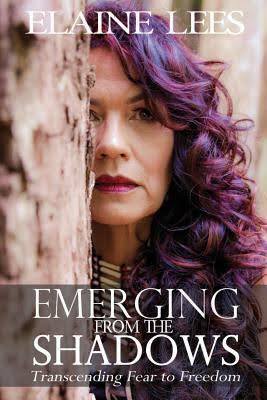 Elaine Lees’ memoir Emerging from the Shadows: Transcending Fear to Freedom is unique for several reasons. Firstly, Lees does not concentrate on domestic violence, yet the abuse she suffered prompted the writing of the book. Secondly, the opinion of the author’s child is also expressed in her mother’s book. Lees’ daughter, Kiri, eloquently voices how she felt as a small child subjected to the horror of seeing her mother and brothers flagrantly abused by their mother’s partner. And lastly, and this for me is the most significant part of the book, Lees sought to emerge from the horror of abuse through reconnecting with her Maori heritage The author discloses that had her father not left the family when she was eleven, had she not reacted to this event with rebelliousness, had she listened to her parents that her choice of partner in her teens might not have been the right man for her, she would arguably not have spiralled into the world of abuse.
Elaine Lees’ memoir Emerging from the Shadows: Transcending Fear to Freedom is unique for several reasons. Firstly, Lees does not concentrate on domestic violence, yet the abuse she suffered prompted the writing of the book. Secondly, the opinion of the author’s child is also expressed in her mother’s book. Lees’ daughter, Kiri, eloquently voices how she felt as a small child subjected to the horror of seeing her mother and brothers flagrantly abused by their mother’s partner. And lastly, and this for me is the most significant part of the book, Lees sought to emerge from the horror of abuse through reconnecting with her Maori heritage The author discloses that had her father not left the family when she was eleven, had she not reacted to this event with rebelliousness, had she listened to her parents that her choice of partner in her teens might not have been the right man for her, she would arguably not have spiralled into the world of abuse.
Fortunately for Lees, she had experienced an idyllic early childhood and later, some exceptional vocational accomplishments. She also recognised the tremendous guilt she experienced for exposing her children to abuse. Though there were strong perceptions of low self-worth and failure in Lees, there was also a spark of the potential to shine that had always been there. She identified what she needed to do to transform her life and set about doing it. Elaine Lees is clearly an incredibly insightful woman because she recognised the lessons that could be learned from the innocent observations of her children, particularly Kiri. She also acknowledged that the loss of the spiritual connection to her parents and the innate wisdom and life experiences of her mother and her mother’s Maori culture affected her. Lees understood that her Maori heritage offered answers to how to traverse the adversities that occurred in her life. And so began her journey of self-discovery.
Maori culture is deeply spiritual. Lees explains that when we connect with that part of us that is Spiritual, the non-physical part of us that connects to Source (or God or Creator, whichever the individual believes in), when we are fully connected to our Wairua (Spirit) and our Mauri (Life Force) we can stand in the fullness of who we are; we can stand in our own power, fully connected to all that is. Lees further observes that since we cannot see our mauri, most people lose their connection with it. The five senses, seeing, hearing, touching, tasting and smelling become the senses people trust and rely on. We must realign our spiritual self with our physical self in order to begin to flourish.
Women everywhere need to leave, must leave, abusive relationships. Yet often they do not. How many have the courage to do so when any self-worth they might have possessed has been beaten out of them? We now know that the abuse is likely to increase immediately, if or when a woman leaves the abuser. The abuser perceives his victim is getting away, so his need to ‘get back at her’ rapidly intensifies. This was graphically illustrated when, after leaving her partner, Rosie Batty’s eleven-year-old son was murdered by his father. When abused, a woman’s self-identity can be so eroded that many begin to question who they are. When they have lost sight of who they are, they see no option other than to remain where they are. If they fight back, they are beaten; if they don’t react to the abuse or if they try to please the abuser to avoid further abuse, they are beaten for their stoicism.
There is abundant wisdom and insight in Lees’ memoir. It inspires women to acknowledge and embrace their birthright of Mana Wahine, no matter what nationality they are for Mana Wahine is the intrinsic feminine psychic force that is within all women. Emerging from the Shadows teaches with the overarching theme of learning from the maiden, the mother and the matriarch. This book should be distributed to every Australasian high school and read by women everywhere.
Thank you, Elaine Lees. You are clearly an amazing woman. See www.elainelees.com

